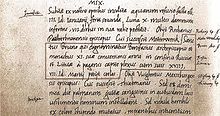Annals of Quedlinburg

The first written instance of the name of Lithuania is in the Annals of Quedlinburg (1009)
|
|
| Original title | Saxonicae Annales Quedlinburgenses |
|---|---|
| Language | Latin |
| Subject | History |
|
Publication date
|
1030 |
The Annals of Quedlinburg (Latin: Saxonicae Annales Quedlinburgenses, German: Quedlinburger Annalen) were written between 1008 and 1030 in the convent of Quedlinburg Abbey. In recent years a consensus has emerged that the annalist was a woman. The annals are mostly dedicated to the history of the Holy Roman Empire; they also contain the first written mention of the name of Lithuania ("Litua"), dated to March, 1009. The original document has disappeared, surviving only as a 16th-century copy held in Dresden, but its contents endure as a scholarly resource.
The city of Quedlinburg, Germany, was first mentioned in writing in a document dated to 922. Saint Mathilda founded a religious community for women at its abbey, serving as abbess from 966 to 999. The abbey became a premier educational institution for the female nobles of Saxony, and maintained its mission for nearly 900 years. The city served as an imperial palatinate of the Saxon emperors, where Henry the Fowler, the founder of the Ottonian dynasty, was buried. Quedlinburg was situated not far from Magdeburg, the Royal Assembly of the empire, and its annalists could therefore rely on genuine information from the royal house and obtain eyewitness accounts. The city lost some stature under the rule of Henry II, who broke with the tradition of celebrating Easter there; the Annals portray him unfavorably, and demonstrate the extent to which a royal monastery was entitled to criticize its monarch.
The Annals open with a chronicle of world history from the time of Adam to the Third Council of Constantinople in 680-681, based on chronicles by Jerome, Isidore, and Bede. The narrative is largely borrowed from multiple older sources until the year 1002, although original reports from as early as 852 are present. Beginning in 993, the narrative begins including events which represent the annalist's own eyewitness testimony concerning events at and around Quedlinburg. The amount of detail increases significantly from 1008 onwards, leading some analysts to conclude that 1008 was the actual date that the Annals were first compiled, although Robert Holzman argues for a start date of 1000. It has been suggested that the annalist temporarily abandoned the project between 1016 and 1021. The exact reasons for this suspension of the work are unknown. Work on the project continued between 1021 and 1030, when its authors were able to report a military victory against Mieszko II.
...
Wikipedia
